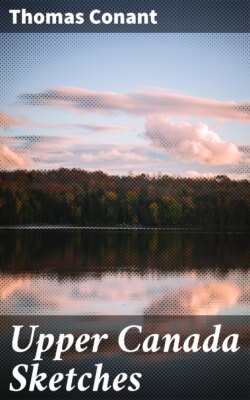Читать книгу Upper Canada Sketches - Thomas Jefferson Conant - Страница 6
На сайте Литреса книга снята с продажи.
ОглавлениеDEED OF ISLAND IN BOSTON HARBOR.
REWARD FOR A DESERTER, 1776, AT WEST POINT.
DEED OF ISLAND IN BOSTON HARBOR.
wood in a deed is peculiar, and it is set forth in a singular way. The Charles Annis mentioned in this deed was a relative of Roger Conant’s, and came to Canada from Massachusetts soon after him. From him most of the Annises in Canada are descended.
Leaving his family at Geneva, New York State, Roger Conant came on to Canada, arriving at the locality afterward called Darlington, County Durham, Ontario, in October, 1778. The first Crown grant of land to Roger Conant was made December 31st, 1778. It consisted of lots 28, 29, 30 and 31, in the Broken Front, Darlington; also south halves of lots 28, 29, 30 and 31, 1st concession Darlington, County Durham—in all about 1,200 acres. After building a house on his land, and probably clearing some portion of it, he returned to Geneva.
What he did between this date and 1794, when he brought his family to Canada, is not known. It is said that during these intermediate years he went to and from Massachusetts several times, in order to collect the proceeds of the sale of his property there. It was during these years that, it is said, he lived among Butler’s Rangers, and from their deeds of violence learned to execrate their memory.
In 1794 he set out again, stopping at Genesee Falls, where Rochester, N.Y., now is. Once the author asked why they did not remain there, and was told that “it was only a black ash swamp, and they did not want it.”
Governor Simcoe’s proclamation, offering grants of land in Upper Canada to those who would come and occupy them, hurried Roger Conant’s journey. Arriving at the mouth of the Niagara River, and hiring a flat scow in which to ferry himself, his family and effects over, he landed at Newark, then the capital of Upper Canada. While there he met Governor Simcoe, who tried to induce him to go up Yonge Street to lands on Lake Simcoe; but not relishing the idea of leaving the shores of Lake Ontario for the wilderness, he refused. The Governor then asked him if he would fight against Canada if trouble came. Roger’s reply was, “No, sir, I will fight for the country which protects me.” And, as we shall presently see, he made good his promise by aiding the British cause in the subsequent war of 1812.
Following the lake shore, camping at night, and fording the streams where they debouch, they at last reached the site of York, then a cluster of Indian wigwams with a few houses in process of erection. The river Don being too deep to ford, they hired Indians to convey them over in their canoes. The waggons were taken apart and so ferried across, when they were put together again, and the emigrants proceeded along the broken shores of the lake.
